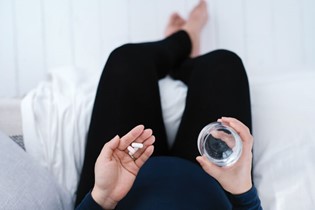So...umm...how are babies made?

Nutritionist and reproductive educator, Chantal Cuthers shares her advice on baby-making.
If you’ve spent the vast majority of your life avoiding getting pregnant, it can feel quite daunting to all of a sudden have a very specific goal of a baby when you get between the sheets. And if you’re a wonderfully exhausted parent already, then how do you even manage the time or find the desire to do it all again? Let’s chat about a few key basics when we head to the bedroom to grow our family.
SO HOW DO WE DO THIS?
Sex should be timed for before and around ovulation to ensure sperm are up there waiting for the egg. With an egg’s lifespan only 12-24 hours, we want the odds in our favour, rather than a race against the clock.
Signs of ovulation are an increased libido and draw to partner – they may smell or look better than they did last week, despite not changing a thing. Increased cervical mucus that appears stretchy and clear with a texture similar to raw egg white, this could be present in your underwear, when you go to the bathroom, or it may be that you need to insert a clean finger to check internally. This is present to offer sperm the highest chance of survival by allowing them safe transport through the acidic vagina, and all the nutrients they need for their journey.
I see many people in practice who are timing sex for when their app tells them they’re ovulating, and while apps can be handy for tracking and showing us patterns, they are not to be used to tell your body what it’s doing. I suggest three months of tracking and if your cycle is between 26-34 days with no other concerns, then rather than have your phone tell you what’s happening, try to ensure you listen to your body first and just use the app as a record of what you’re experiencing.
IT'S NOT AS SEXY WHEN IT'S SCHEDULED, RIGHT?
Sex can feel very transactional when it comes to baby making, with a little added anxiety of trying to time it right. And let's be honest, ovulation doesn’t always fit into a window with lots of spare sexy time, but as much as possible aim for it to be somewhat pleasurable for both parties. This doesn’t have to be mind-blowing, but a little bit of effort here will go a long way.
Put the app, the thermometer and the ovulation predictor kits down for a bit, check in with your body and your partner, schedule some time for pleasure, some laughter, some moments away from phones. Connection is crucial in these moments as anxiety and overthinking can kill the bedroom mood at the time when you want the most action.
If you are already parenting, then finding an opportunity for time together in addition to some energy for the deed isn’t always easy. Scheduling can work in your favour by providing some healthy anticipation and maybe something to look forward to. Have a little fun with it, don’t expect too much, try and just use it as an opportunity to exchange touch and share connection as a start, with sex as a cherry on the top, should it happen.
MY CYCLE HASN'T RETURNED POST-BABY, WHAT SHOULD I DO?
If you’re still breastfeeding, and don’t want to stop, it’s likely you’ll need to convince your body that you can continue to feed while also growing another human. As a start, this often requires an increase in food and food regularity.
If you’ve stopped breastfeeding for longer than three months then a GP check in for some blood work and a realistic look at your sleep quality and food intake is the next step before touching base with a fertility-experienced registered nutritionist or dietitian.
In my experience, parents are consistently under-eating or over-caffeinating. If you think you fall into either of these categories, then start with small snacks and meals every 2-3 hours. Sleep quality is crucial, as melatonin is required for ovarian function so shutting off the blue light and that scrolling earlier is better. Meditation, yoga, or an enjoyable playlist all within an evening routine that will help facilitate sleep is key.

WHAT ABOUT MY DIET IN GENERAL?
While there is no magic ingredient, food is definitely a foundation we don’t want to forget about.
We have higher energy needs to get pregnant, and in times of restriction are likely to risk ovulation entirely. Focus on ingredients to add instead of foods to avoid. There should be a focus on meals you enjoy, increased fruit and vegetables, protein sources at each meal, no skipping meals or replacing them with coffee, and don’t be afraid of healthy fats.
Sex and libido require energy, so eating to fuel your daily needs and your desire for bedroom action is key. Now is not the time for restriction or weight loss dieting. It’s time to use any opportunity we can to nourish and support our body.
WHAT ABOUT SAVING SPERM?
We know the more demand we have for sperm, the more frequently they’re made. Aiming to produce the young, fit and healthy ones by regularly removing any damaged and sluggish ones is key. Aim for ejaculation every 2-3 days solo or partnered before that ovulation window, and then every 2 days together during it.
GETTING SOME MEDICAL HELP?
If you’re making your family with the help of sperm donation or using our amazing medical technology via IUI or IVF, then please don’t forget about your pleasure. Blood and oxygen delivery to your reproductive organs is key so whether it’s gentle yoga, diaphragmatic breathing or masturbation, your self-pleasure should be a priority and is very important.
UNDERSTANDING YOUR BODY AND CYCLE
+ Your cycle should be 26-34 days in length with 1-2 days variance but not much more.
+ You should have a period of 3-5 bleeding days, little to no clots passed, and little to no PMS symptoms. No extremely tender breasts, no extreme moodiness, very-little to no pain, no major acne flare ups.
+ You should notice changes in energy throughout your cycle but nothing debilitating and no major fatigue.
+ You should notice signs of ovulation – egg white stretchy mucus prior to ovulation. This is when you have sex for a baby, not after. This mucus should change to white, thick, creamy after ovulation.
+ If you’re tracking, you should track key symptoms like days you bleed, mucus changes if they’re not normally obvious to you, temperature, if you sleep well, wake up at the same time and don’t drink alcohol, and anything out of the ordinary. Don’t use your app to tell you what your body is doing, use your body to tell the app. This means we can look at your overall patterns of a cycle or cycle period of 3-6 months.
+ Outside of IUI, know that sperm will need to rest and feed off your cervical mucus, and then travel between 1 hour-several days to get to the egg, depending on their health. You want the sperm up there and waiting for greater chances! So time sex before you ovulate, especially if your partner is highly stressed, has any health concerns or isn’t very physically active.
+ If you want to use tracking with basal body temp (BBT) you should do this for 3 months to confirm ovulation and you must have a thermometer that has 2 decimal places, 00.00, not 00.0 otherwise you will not notice the delicate fluctuations in temp required to assess your cycle.
+ I prefer that you avoid ovulation predictor kits (OPK’s) which can be difficult to gauge accuracy of and only read LH, which can have multiple surges before ovulation or a short surge you miss and yet still ovulate.
Chantal is a NZ Registered Nutritionist with a specialist interest in reproductive, fertility nutrition, infant feeding, and a passion for non-diet, gender and weight inclusive care. She lives in the Coromandel with her partner and two young children. Find more about working with her at nutritionbychantal.co.nz.

AS FEATURED IN ISSUE 59 OF OHbaby! MAGAZINE. CHECK OUT OTHER ARTICLES IN THIS ISSUE BELOW

















